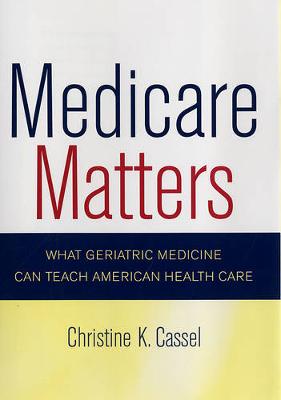California/Milbank Books on Health and the Public
1 primary work
Book 14
Savvy, comprehensive, and authoritative, this book, written by a physician with more than thirty years' experience caring for elderly patients, assesses the current state and the future prospects of Medicare, perhaps the most influential health care program of our time. Christine K. Cassel draws upon the latest developments in science and medicine in a sweeping analysis of Medicare's social, demographic, institutional, political, and policy contexts. Writing in accessible language, using case studies to illustrate how policies translate to everyday lives, and applying lessons from the practice of geriatric medicine, Cassel makes a powerful argument for reforming and modernizing Medicare. She offers a new vision of what healthy aging could be and delineates what is needed to reach this vision, including changes in the medical sector, in the policy arena, and in our cultural beliefs about aging.
Cassel sheds light on a wide range of issues pertaining to Medicare, including debates about coverage and the looming deficit in the Medicare Trust Fund. Perhaps the most controversial issue she addresses is the challenge of rationing some kinds of care. Anchoring her discussion of Medicare in the idea that care for the elderly represents a social contract between government and its citizens, Cassel describes both the principles and potential of a progressive approach to geriatric medicine. She further argues that with this approach, we can also address the chronic problems of our larger health care system and provide all Americans, no matter what their age, with high-quality and affordable medical care.
Cassel sheds light on a wide range of issues pertaining to Medicare, including debates about coverage and the looming deficit in the Medicare Trust Fund. Perhaps the most controversial issue she addresses is the challenge of rationing some kinds of care. Anchoring her discussion of Medicare in the idea that care for the elderly represents a social contract between government and its citizens, Cassel describes both the principles and potential of a progressive approach to geriatric medicine. She further argues that with this approach, we can also address the chronic problems of our larger health care system and provide all Americans, no matter what their age, with high-quality and affordable medical care.
